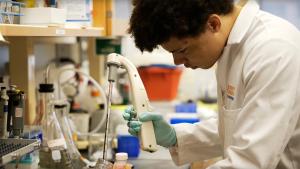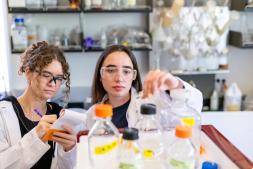Undergraduate Research
Why should undergraduates get involved in research? At UVA Engineering, we believe students become engineering leaders through hands-on learning and research opportunities, because they gain not just technical knowledge, but also higher-level skills in communication, collaboration, analysis, problem-solving and ethical decision-making.
Undergraduate researchers frequently get opportunities to travel to conferences and publish and present their work. All of these experiences make students' time at UVA special and are highly attractive to future employers. We strongly encourage undergraduate students to work with faculty and graduate students in our world-class laboratories.

Exploring Undergraduate Research at UVA Engineering
Malcolm O'Malley explains how supportive faculty and graduate students helped him grow as an undergraduate researcher.
"Undergraduate research is vital to your experience as a student, especially if you have no idea what you want to do in the future or if you are interested in graduate school. My research experiences have helped me leave my mark on the engineering community and connect the dots between the classes I took while at UVA. "
 Darius Carter
Bachelor of Science Class of 2017, Ph.D. 2021, Department of Mechanical and Aerospace Engineering and the Link Lab for Cyber-Physical Systems
Darius Carter
Bachelor of Science Class of 2017, Ph.D. 2021, Department of Mechanical and Aerospace Engineering and the Link Lab for Cyber-Physical Systems
Five Ways for UVA Engineering Undergraduates to Get Involved in Research
Check Out Available UVA Engineering Projects
UVA Engineering faculty, post-doctoral researchers and graduate students frequently have projects available for undergraduates. Linked here is a list of open opportunities, and the list is updated at the beginning of each semester and before summer. The list includes instructions on how to apply for positions through Handshake, which is UVA's online system for connecting students to jobs, internships and prospective employeers, scheduling career advising appintments, and sharing career events and resources. The team at the Center for Engineering Career Development also is happy to assist students with using Handshake and writing strong resumes. Contact them at engineeringcareers@virginia.edu.
The list of undergraduate research opportunities can be sorted by department or by research area.
Pursue Your Own Interests
If you have your own idea or area of interest you would like to explore, visit UVA Engineering's research pages to learn more about the faculty and graduate students working in that area, and then contact a faculty member or lab group to ask whether they are accepting undergraduate student researchers. If you don't hear back right away, wait a week or two and try again. Be polite but persistent, and remember that sometimes there are multiple faculty members working in a given research area. Consider contacting more than one to learn more about what they are doing in their labs.
Consider a Specialized Research Program
The University of Virginia and the School of Engineering have multiple programs that offer rich, high-level undergraduate research opportunities.
Undergraduate Student Opportunities in Academic Research (USOAR) - USOAR targets rising first-year, second-year and transfer undergraduate students who qualify for Federal Work Study and do not have previous significant experience in research, providing an opportunity for a paid research position.
National Science Foundation Research Experiences for Undergraduates (REU) - UVA's two summer REU sites are:
- Advanced Materials Synthesis - The Department of Materials Science and Engineering will recruit 10 undergraduates to participate in a new, 10-week REU in summer 2022. The program will immerse rising sophomores through seniors in authentic materials research projects.
- Multi-Scale Systems Bioengineering and Biomedical Data Sciences - Each summer, faculty in the Department of Biomedical Engineering train 10 undergraduate students in the skills, confidence and mentorship necessary for careers in the exciting field of multi-scale systems bioengineering and biomedical data sciences.
The University of Virginia Kidney Technology Development Research Education Program - This is an immersive clinical and laboratory experience focused on the study of kidneys in health and disease.
Biomedical Engineering Clinical Scholars - The BME Clinical Scholars program immerses undergraduates in clinical settings, identify unmet clinical needs, and generate clinically relevant problems and case studies for biomedical engineering classrooms.
Virginia Microelectronics Consortium Summer Scholars Program - This program offers juniors and seniors attending a university in Virginia the opportunity for hands-on research using state-of-the-art technology in either an academic or industrial environment. UVA students go to another participating university, while students from other universities come to UVA.
Center for Advanced Self-Powered Systems of Integrated Sensors and Technologies (ASSIST) - ASSIST offers a summer Research Experiences for Undergraduates program as well as a Research Fellows Program during the academic year for students from partner institutions.
Take a Class on Research
The Starting an Undergraduate Research Experience (SURE) program is a new class and workshop series geared toward new students who are interested in getting involved in research at UVA, but aren’t sure where to start.
Once I Land a Research Opportunity, How Does It Work?
You will work with your new research mentor (a faculty member, grad student or post-doctoral researcher) to establish their expectations of you in the lab. Every lab is different. Each has its own culture of expectations. It is the mutual responsibility of the lab's faculty leader and the students and other researchers working in the lab to be clear on the expectations. How many hours will you work? What project will you be doing? What training will you need? Don't hesitate to talk with your research mentor and others in the lab about any and all of these things.
Your mentor will also decide with you whether the work will be done for credit, for pay, as a work-study opportunity, or on a voluntary basis. Don't be afraid to ask your mentor for one of those four types.

What Future Engineering Leaders Do: Undergraduate Research
Want to know the best way to get involved in research? Watch this video to learn the simple steps.


